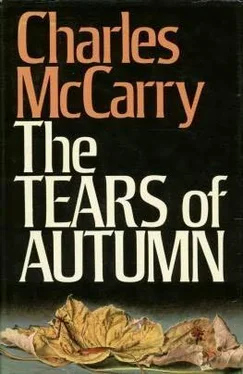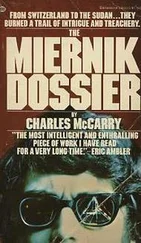Klimenko’s voice was growing thinner, as if he had suddenly caught cold. “Name a place,” he said. “Just make sure it’s secure.”
“This is not my work.”
Christopher put a hand on Klimenko’s shoulder; the flesh was loose under his thick overcoat. Christopher had always liked the Russian, but he knew what mistakes he could make. “How long do you expect to stay operational if you go around in public like this?” he asked.
“Not long. You see what’s happened to my nerves.”
“Why did you come out? You’ve always been a loyal Russian, haven’t you?”
The skin of Klimenko’s sagging face was blotched, brown and white like the meat of a bitten pear. “Loyal to Russia, yes -and I still am. I no longer agree with the line.”
“It’s no different than it ever was.”
“No. But I am. One gets tired. Doubts become more important-Klimenko’s Law: as life shortens, misgivings magnify.”
“Then I’m sorry you’ve come to the wrong man.”
“I can tell you how the arms come to the V. C. through Cambodia,” Klimenko said in a rush of words. “I can tell you what we are going to do with the structure of the Cuban intelligence service. I can give you names you don’t have. There’s been a change in the funding system-I set it up, I know the banks and the account numbers. Paul, don’t be foolish.”
Christopher shook his head.
“I know what you think,” Klimenko said. “You’re worried about your cover. But you have no cover with us. We know about you-we’ve known for years. When you begin thinking about yourself you lose your profession. I know.”
A Vatican guard appeared in the stairway door. “The gallery is closing,” he said in Italian.
“Do you want to go down first?” Christopher asked.
Klimenko uttered a little laugh; he was in possession of himself again.
“It’s comic how I fit the defector’s pattern,” he said. “I tell you how I love Russia, and offer you her secrets in exchange for safety. It’s no wonder people like you and me exist, Paul-men are so predictable, so easy to use. I know what you’ll do next. We’d better set up a meeting now. I don’t want to use the telephone anymore.”
“Gherman, I won’t see you again. I can’t help you. What I’m telling you is not technique, it’s the truth.”
“You don’t believe in the quality of the merchandise.”
“I care nothing about it one way or the other.”
“Signori,” the guard said, “you must descend now. The gallery is closing.”
Klimenko fluttered his gloved hand impatiently at the guard. He turned his back on the man and again put his face close to Christopher.
“There was an operation in the States last month,” he said. “The code word was Weedkiller. A million dollars went through a certain Swiss bank. An American got the money. A million dollars, Paul. Think about that.”
“When?”
“The money went into the bank in Zurich on November 25. It was taken out the next day, just before the bank closed.”
“By whom?”
Klimenko looked aside. “I don’t tell you that now. When we meet again, when I have assurances-but not on this roof, in the rain.”
“You’ll have assurances when I have this information,” Christopher said.
“Weedkiller?”
“Yes. All of it.”
“Tomorrow,” Klimenko said. “I can’t wait longer than that.”
Christopher nodded and smiled at the guard, who had come onto the gallery and was walking toward them with his arms thrown out and his shoulders shrugged to show that he was at the end of his patience.
“All right,” Christopher said. “Five o’clock in the morning, in the Protestant cemetery behind the Porta San Paolo. I’ll meet you on Shelley’s grave.”
“Romantic,” Klimenko said.
He walked away, leaving Christopher to talk to the remonstrating guard, who might remember him.
In one of the souvenir shops near Saint Peter’s, Christopher bought a postcard of John XXIII. He took a taxi to the main post office in the Piazza San Silvestro and, using the typewriter at the telegraph office, typed the name and address Nsango used in Elisabethville on it. In the message space he typed a Christmas greeting in French and signed the message with three initials. He could speak like a Frenchman, but his handwriting was plainly American.
He dropped the card in the airmail box outside and walked next door to the long-distance telephone office. When the call came through, the clerk put him in Cabin 10 as usual, and he could hear the tap sputtering on the line. Sybille answered.
“You’re coming for Christmas!” she said.
“No, I want to invite you down here.”
“My dear, we can’t. We’d have to charter an extra plane to carry the presents my husband has bought me to make up for his guilty conscience.”
“Is he there?”
“At five-thirty? Have you forgotten already what it is to be chained to a machine gun like a poor German private, rat-tatting away for the Fatherland?”
“Will you give him a message? Tell him I’d like to have lunch with him. Write down the date and time carefully-you know what his memory is.”
Christopher gave her a formula that would bring Webster, if he understood it, to Rome the following afternoon.
The shops had just reopened and the streets were teeming. Christopher went into a jewelry store and bought an opal ring for Molly. He put it in his pocket and walked into the Rinascente next door; the department store was so crowded that he moved sideways through a pack of unmoving Italians. He went to the top of the store on the escalator and came back down the stairs, leaving by the front entrance. By the time he reached the taxi stand behind the Galleria Colonna across the street, he was certain that he was still alone.
He rang his own doorbell six times, four long and two short. Molly tapped on the inside of the door four times, and he rang again twice. He heard the locks turning and the chain rattling, and Molly opened the door. She held a bottle of champagne in her hand.
“Can you open this without fumbling?” she asked. “It’s three thousand lire the bottle, you know.”
Sitting on the sofa, Christopher told Molly to close her eyes. He put the opal ring on her finger.
“It’s beautiful,” Molly said. “But aren’t opals supposed to bring bad luck?”
“A little superstition will do us good. Gaze into the stone, Molly, and live each day as if it were your last.”
“What a wonderful sense of humor you have. Is all this business really a joke to you?”
“Isn’t it a joke? Think of it-some little fellow with hate in his heart, deadly dramatic, stalking us in Christmas week. If he exists, he wouldn’t even have been told who we are or why he’s supposed to kill us. All he asks is a chance to be taken seriously.”
“I take him seriously.”
“Take his gun seriously, and his delusions,” Christopher said. “But not him. He’s just a man, and a weak and stupid one or he wouldn’t let himself be used. We know about him. That cancels his value.”
Molly kissed him. She wore no scent or makeup; he had always thought her as clean as a child. Molly did not like the image.
“After this morning,” she said, “I go on the premise that anything is permissible. I’ve been reading your poems again. Explain what you meant by these lines:
“In the cave where my father grows,
He sees my son undoubling from a rose.”
“Christ, Molly, I don’t know. It rhymed.”
“Open up,” she said, pointing a finger.
“I loved my father,” Christopher said. “He lived his whole life without doing anyone any harm. I think I hoped, if I ever had a child, that it would manage to stay innocent, the way the old man did.”
Читать дальше












